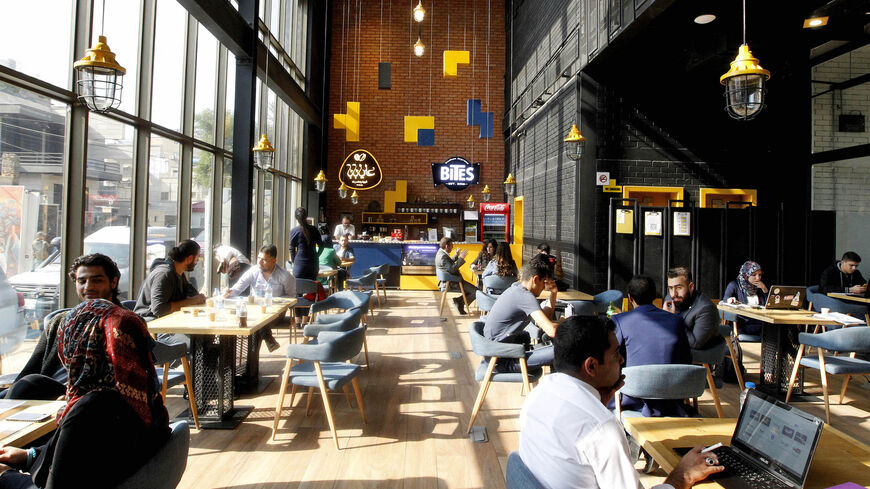Despite a global slowdown in venture capital deal-making, Iraq’s start-up scene can boast a number of successful deals in 2022.
Most recently, on Dec. 7, Erbil-based delivery start-up Lezzoo acquired the business-to-business marketplace platform Sadyo for an undisclosed amount. The acquisition is part Lezzoo’s expansion plans as it works to digitize Iraq's food supply chain.
In October, Baghdad-based Orderii, an e-commerce platform that provides logistics services for sought-after goods only available on foreign sites, secured six figures in funding in a pre-seed round.
Unlike Saudi Arabia, the United Arab Emirates or Egypt, Iraq does not have a thriving start-up ecosystem and largely goes unnoticed by most regional or international venture capital investors. However, a proliferation of new start-ups, an improving political and security environment as well as a positive economic outlook could change the course of this in the coming years.
Iraq’s economy is forecast to grow 8% in 2022 on the back of increased oil production, according to the International Monetary Fund. Although Iraq remains heavily reliant on oil, the IMF expects non-oil real GDP growth to be 3% in 2022 and expand to 4% in 2023.
These factors along with such dynamics as a population of around 40 million with 93% under the age of 54 and 50% with access to the internet suggest there are ample business opportunities for start-up entrepreneurs.
“As security improves and as Iraqi youth continue to innovate, there is growing interest in the market,” said Ashley Barlow, executive director of Baghdad-based innovation hub The Station. “I hope that success stories from Iraqi start-ups will become the trigger for a mindset change that will shift focus away from the public sector and foster a greater belief in the private sector's potential.”
Iraqi start-ups raised a total of $16 million from six deals in 2022 compared to $7 million from seven deals in 2021, according to Magnitt, a Dubai-based data platform on MENA start-ups.
Baly, a Baghdad-based ride-hailing app backed by Germany’s Rocket Internet, secured Iraq’s largest seed funding round of $10.5 million via a consortium of regional and international investors in January 2022. The Iraqi food and grocery delivery app TipTop raised $5 million in seed funding.
“When it comes to investment, the dollars have been pouring into e-commerce and food and delivery services sectors,” said Azza Yehia at Five One Invest, an Erbil-based tech incubator. “These sectors received the most investor attention. Other areas like Edtech have also received financing. There are also opportunities in agritech, greentech and quick commerce.”
Regional tech companies are also looking to capitalize on Iraq’s growing tech market.
“We have witnessed the expansion of a couple of companies from the wider regions such as Noon Academy, Careem, Talabat and others that have done relatively well in building a user base,” said Eyad Alharbi, senior investment associate at RAED Ventures, a Riyadh-based early-stage VC investor. “We are also keeping an eye on the emerging local consumer apps in food delivery and quick commerce which have been able to build a customer base as well.”
However, while activity increases and opportunities arise, Iraq’s tech ecosystem still has a number of challenges to overcome.
Yehia noted that start-ups face many obstacles, including a lack of proper bookkeeping, software systems and documentation, adding that the legislative environment represents one of the biggest challenges.
For local tech entrepreneurs like Basima Abdulrahman, founder & CEO of KESK, an Erbil-based greentech firm, finding skilled talent has proved a big challenge.
“Finding a proper technician has been difficult because they lack the technical skills,” she said. “I think this gap in human capital is related to different issues. The education system, for instance, is not preparing graduates with the necessary skills for the workplace.”
Matteo Mantovani, co-founder and managing director at Baly, said that start-ups also have to deal with civil unrest and inadequate infrastructure.
“Our challenges are changing weekly,” he said. “Operational hindrances can include employee strikes, floods, dust storms, sudden road or city blocks as well as protests.”
While support for start-ups via accelerator programs, mentorships and incubators is increasing, later-stage scale-ups struggle to secure bigger financing from local investors.
“Most local investors come under the umbrella of local merchant families,” said Mohammed Khudairi at Iraq Venture Partners. “On the whole they can only provide limited investment tickets.” He explained, “Series A and B-ticket sizes are large and require $2 million to $5million. For investments of that size, we need more regional and international investors.”
The underdevelopment of Iraq’s banking system also makes it difficult for entrepreneurs to access financing to fund their growth.
“It is difficult for mid-stage start-ups to access financing like debt financing,” said Abdulrahman. “Banks usually ask for collateral. There are few options for start-ups inside Iraq, so most have to go regional. There aren't developed financing options like SAFE, which would be perfect for a lot of start-ups in Iraq.” SAFE, or simple agreement for future equity, is a type of financing contract.
Nevertheless, stakeholders are optimistic that Iraq’s tech ecosystem can overcome these challenges and will continue to grow.
“I think within the next 5-10 years we will see more innovation and technology enabled businesses. A lot of these start-ups will help Iraq-specific issues like checkpoints, energy, power and security,” said Khudairi.








